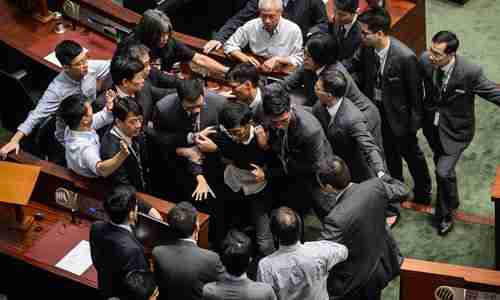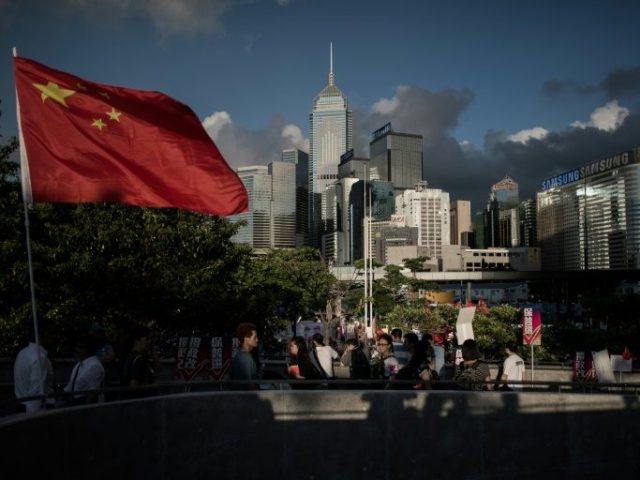This morning’s key headlines from GenerationalDynamics.com
- Hong Kong legislature in chaos, under threat of intervention by mainland China
- Sudan follows Uganda, Namibia in cutting ties with North Korea
Hong Kong legislature in chaos, under threat of intervention by mainland China

Newly elected lawmaker Baggio Leung is restrained by security while attempting to deliver his oath of office (AFP)
Hong Kong’s legislative election on September 4 handed Beijing a stinging defeat, as pro-democracy or “localist” candidates won 27 out of 70 seats for the Legislative Council of Hong Kong (LegCo). There was little doubt at the time that this would substantially exacerbate the level of tension between Hong Kong and Beijing, and now, we’re seeing the first results.
Hong Kong’s LegCo has been in chaos for almost a month, thanks to two newly elected lawmakers, Yau Wai-ching and Sixtus Baggio Leung Chun-hang, from “Youngspiration” who have gone beyond “pro-democracy” to advocating full Hong Kong independence from China.
When they took their oaths of office on October 12, they changed the wording of the official oath of office to express support for Hong Kong’s independence, and to describe China using a derogatory term. Their oaths were invalidated, and since then, pro-Beijing legislators have been staging walkouts and using other parliamentary tricks to keep them from being seated at all.
Anticipating trouble on Wednesday, the LegCo president moved the council’s meeting from the main chamber to a conference room. The two localists responded by storming into the conference room and demanded to take their oaths of office and be seated. They were forcibly ejected by security personnel.
The two localists will appear in a Hong Kong court on Thursday, and there are a couple of outcomes that would be extremely controversial:
- The court might rule that the two are disqualified from being seated in LegCo. This would be the first time that a Hong Kong court overturned a legitimate election of a legislator. Whichever way the ruling goes, it would be appealed, and the confrontation would continue.
- Even worse, mainland China’s National People’s Congress Standing Committee (NPCSC) may preempt the Hong Kong court and intervene, using its power to “interpret” Hong Kong laws, as a way of disqualifying the two. Such an intervention is likely to trigger large anti-China protests.
There is a growing reality with both Taiwan and Hong Kong. Mainland China’s government in Hong Kong has been using a carrot and stick approach with both entities for years, hoping that the people would eventually fall in love with Beijing and want to be governed by Beijing. This hope is extremely delusional, of course, but being delusional is China’s only path other than full-scale invasions of both entities to bring them under control.
For both Hong Kong and Taiwan, the generations of survivors of World War II and Mao’s Communist Revolution have taken steps to encourage unification with Beijing, or at least to avoid angering Beijing. But it is increasingly clear to everyone that younger generations are increasingly hostile to Beijing.
This means that there is no advantage to Beijing to waiting. Taiwan and Hong Kong will increasingly want independence. Furthermore, as we’ve seen with Hong Kong’s Umbrella Revolution and Taiwan’s Sunflower Movement, independence movements in Taiwan and Hong Kong feed off of each other, and support each other, and may even have synergy with independence movements in Tibet (by Buddhists) or Xinjiang (by Uighurs). Beijing has already said that that it will violently crush anyone who even talks about “independence.” This is a continually worsening situation that Beijing is certain to find increasingly dangerous, enough to trigger a violent reaction at some point. South China Morning Post (Hong Kong) and BBC and Global Times (Beijing)
Related Articles
- Sharply polarized Hong Kong electorate hands Beijing a stinging setback (06-Sep-2016)
- Taiwan’s pro-independence party wins historic presidential election (17-Jan-2016)
- Sunflowers and Umbrellas: Taiwan voters choose independence from China (30-Nov-2014)
- Hong Kong protesters fear more violence by China’s ‘Triad’ gangs (05-Oct-2014)
Sudan follows Uganda, Namibia in cutting ties with North Korea
Under pressure from South Korea, Sudan has ended all military cooperation and diplomatic connections with North Korea. According to a statement posted by South Korea’s Ministry of Foreign Affairs:
[Foreign Minister Ibrahim Ghandour of Sudan] mentioned that Sudan has completely cut off its military cooperation with North Korea, has no North Korean diplomatic missions in the country as well as no diplomatic missions of its own in the North, and has no plans for high-level exchanges. The Minister, calling nuclear weapons an obstacle to peace and security, stressed that Sudan is thoroughly implementing UN Security Council sanctions resolutions on North Korea.
Sudan is the third African country this year to declare that it would comply with UN sanctions against North Korea. Uganda announced in July that it would several military and security ties with North Korea, and this was followed by a decision of Namibia to oust two North Korean firms that were constructing an arms and munition factory in nation’s capital, Windhoek.
Other African countries are maintaining ties with North Korea. These include Angola, DR Congo, Zimbabwe, Burundi, and Equatorial Guinea — also countries that are themselves targets of UN sanctions. N. Korea News and S. Korea Ministry of Foreign Affairs and NK News (7/28)
KEYS: Generational Dynamics, China, Hong Kong, Legislative Council of Hong Kong, LegCo, Yau Wai-ching, Sixtus Baggio Leung Chun-hang, National People’s Congress Standing Committee, NPCSC, Umbrella Revolution, Taiwan, Sunflower Movement, Tibet, Xinjiang, North Korea, Sudan, Ibrahim Ghandour, Uganda, Namibia, South Korea, Angola, DR Congo, Zimbabwe, Burundi, Equatorial Guinea
Permanent web link to this article
Receive daily World View columns by e-mail

COMMENTS
Please let us know if you're having issues with commenting.